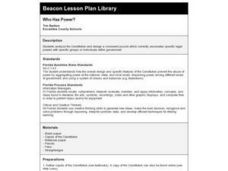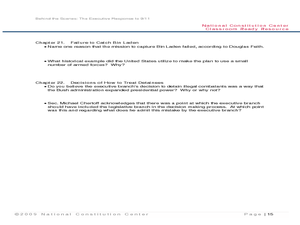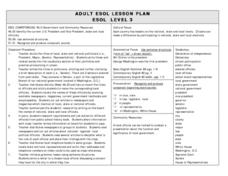Curated OER
The Preamble to the Constitution: How Do You Make a More Perfect Union?
Students analyze the Preamble of the Constitution and identify the historical context that led to its wording. They, in groups, interpret phrases from the Preamble, examine relevant court cases and create illustrations for their portion...
School District of Detroit
The Articles of the Confederation
Primary historical sources can be a challenge for some readers, so these seven guided-reading questions will be very useful to US History or Government classes studying The Articles of Confederation. Each question has multiple parts and...
Reading Through History
The Federalist Papers: Federalist Paper No. 51
How did Federalists feel about the federal government? Learners search for the answers in the Federalist Paper No. 51, which discusses the powers of the presidency. Then, they answer various questions to test for their comprehension of...
Reading Through History
Anti-Federalist Paper No. 47
The path to a more perfect union was rockier than most history books would lead you to believe. Young historians read “Antifederalist No. 47,” written by James Madison (under the pen name “Centinel”), which sharply criticizes the...
Curated OER
The Virginia Plan and the New Jersey Plan: Student Worksheet
These guided reading questions accompany several websites on the development of the US Constitution. While some of the links have changed, they are still accessible. History or government classes benefit from reading primary source...
Curated OER
All Americana
Fifth graders research American landmarks and symbols. In this United States history lesson, 5th graders create a KWL chart about the symbols of America and take notes during a PowerPoint presentation. Students complete the rest of the...
Curated OER
The Civil War
Although we currently focus on Abraham Lincoln's positive contributions in creating a more equal society, the truth is that Lincoln was actually a controversial character in his time! After studying the Civil War, give your high...
Curated OER
An Introduction To Law
Students identify 4 branches of law-criminal, civil, consumer, and family. using a newspaper, they locate examples of how laws affect citizens on a daily basis.
State Bar of Texas
Marbury v. Madison
Who has the final say in matters dealing with the rules under the United States Constitution? The case Marbury v. Madison brings to light the issue of judicial review. Learners investigate the Supreme Court's opinion in the case with a...
Federal Reserve Bank
Piggy Bank Primer: 25 Cents Worth of History
It's all about money. Here's a resource that introduces kids to the Federal Reserve System, different coins produced by the mints, and fun facts about state coins.
PBS
Civic Engagement and How Students Can Get Involved
There is no age limit on civic engagement. Even if your pupils are not old enough to vote, they are old enough to get involved. Show them how with a PBS lesson that underscores the importance of civic participation and models ways young...
Curated OER
Representing Our Nation
Students use pennies to illustrate how our states are represented in Congress. This lesson is to be implemented during a unit covering the branches of United States government.
Curated OER
Who Has Power?
Fourth graders discuss abuse of power in government and examine the Constitution for specific powers in each branch. They create a crossword puzzle utilizing terms and information regarding division of government powers and federalism
Curated OER
Who's Who in Government: Past, Present and Future
Twelfth graders research a list of governmental leaders of South Carolina's past and present. They briefly identify each by writing a short summary which includes the dates of their political career, party affiliation, positions held in...
Curated OER
Shifting Wins
Students analyze how the outcome of the 2002 midterm elections changed the balance of power in the government. They write a news analysis and evaluation of how the nation be governed in the future.
Curated OER
Constitutional Issues: The Separation of Powers
Learners research and stage a debate on the question: RESOLVED that the Constitution should be amended to provide for a parliamentary system of government. They debate if a parliamentary system of government might be better.
Curated OER
Behind the Scenes: The Executive Response to 9/11
Students examine the actions of the executive branch following the September 11th terrorist attacks. In this U.S. government activity, students watch segments of a video titled "Behind the Scenes: The Executive Response to 9/11."...
Curated OER
Who Are Your Local Officials?
Students identify the names and positions held by local public officials. In pairs, students research the requirements and duties needed to hold office. A brief presentation of their research will include the names and positions of...
Curated OER
Representation of the Common Citizen From Declaration of Independence to Present
Students create working definition of common citizen, and investigate and discuss important sections of Declaration of Independence, Articles of Confederation, U.S. Constitution, Bill of Rights, and other Amendments. Students demonstrate...
Curated OER
Bill of Rights and Lawmaking
Ninth graders consider how the Bill of Rights impacts the lawmaking process in the United States. For this Bill of Rights lesson, 9th graders discuss the amendments and their limitations. Students research the role of the Legislative...
Curated OER
Taking From the Giving Tree
Young scholars explore the ways in which various American cities negotiate the protection of their "green infrastructure," gaining a broader understanding of proposed and enacted legislation as it relates to preserving and planting trees...
Curated OER
The Embodied Presidency
Tenth graders analyze Roosevelt's Fireside Chats. In this Franklin D. Roosevelt presidency, 10th graders determine how well FDR's government programs aided victims of the Great Depression. Students examine selected Fireside Chats and...
Curated OER
Utah's Legislative Branch: How a Bill Becomes a Law
Seventh graders explain the steps by which a bill becomes a law. They research how a bill becomes a law within the three branches of Utah's government and synthesize their research and discussion in a classroom representation of government.
Curated OER
The President's Role and Succession
Fourth graders examine the role the President of the United States plays in American government and the order of succession of cabinet members. They explain about presidential qualifications and the path to becoming President.























